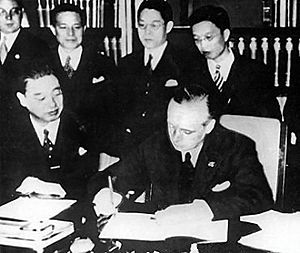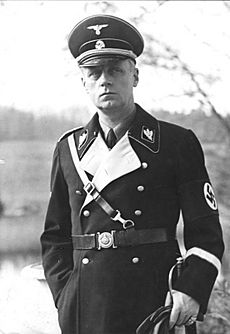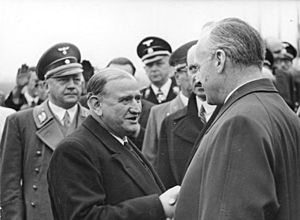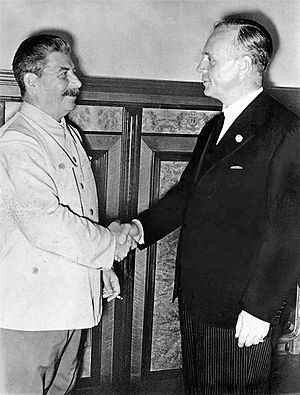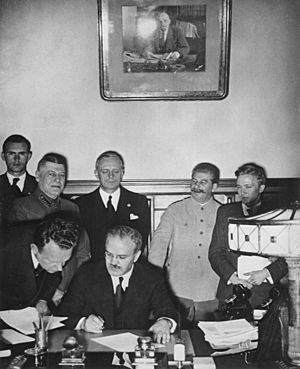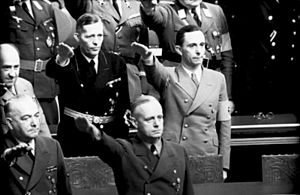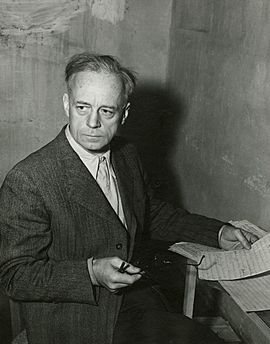Joachim von Ribbentrop facts for kids
Quick facts for kids
Obergruppenführer
Joachim von Ribbentrop
|
|
|---|---|
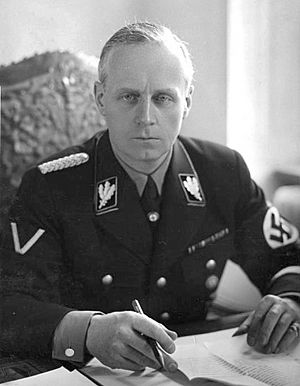
Ribbentrop in 1938
|
|
| Reichsminister of Foreign Affairs | |
| In office 4 February 1938 – 30 April 1945 |
|
| Führer | Adolf Hitler |
| Preceded by | Konstantin von Neurath |
| Succeeded by | Arthur Seyss-Inquart |
| German Ambassador to the United Kingdom | |
| In office 11 August 1936 – 4 February 1938 |
|
| Appointed by | Adolf Hitler |
| Preceded by | Leopold von Hoesch |
| Succeeded by | Herbert von Dirksen |
| Personal details | |
| Born |
Ulrich Friedrich-Wilhelm Joachim von Ribbentrop
30 April 1893 Wesel, Kingdom of Prussia, German Empire |
| Died | 16 October 1946 (aged 53) Nuremberg Prison, Nuremberg, Allied-occupied Germany |
| Cause of death | Execution by hanging |
| Political party | Nazi Party (1932–1945) |
| Spouse |
Anna Elisabeth Henkell
(m. 1920) |
| Children | 5 |
| Profession | Businessman, diplomat |
| Signature | |
| Military service | |
| Allegiance | German Empire |
| Branch/service | Imperial German Army |
| Years of service | 1914–1918 |
| Unit | 12th Hussar Regiment |
| Battles/wars | World War I |
| Criminal conviction | |
| Criminal status | Executed |
| Conviction(s) |
|
| Trial | Nuremberg trials |
| Criminal penalty | Death |
Joachim von Ribbentrop (born April 30, 1893 – died October 16, 1946) was a German politician and diplomat. He served as the Foreign Minister for Nazi Germany from 1938 to 1945.
Ribbentrop became important to Adolf Hitler because he had traveled a lot. He knew more about other countries than most other Nazi leaders. He even offered his home for secret meetings in January 1933. These meetings helped Hitler become Chancellor of Germany. Ribbentrop became a close friend of Hitler, even though some other Nazis didn't like him. They thought he wasn't very smart or talented.
He became Germany's ambassador to the United Kingdom in 1936. Then, in February 1938, he became the Foreign Minister. Before World War II, he helped create important agreements. These included the Pact of Steel with Fascist Italy and the Molotov–Ribbentrop Pact with the Soviet Union. He wanted Germany to stay friends with the Soviets and didn't want to invade them.
After 1941, Ribbentrop's power began to fade. He was arrested in June 1945. At the Nuremberg trials, he was found responsible for his part in starting World War II and for the the Holocaust. On October 16, 1946, he was the first Nazi leader to be executed by hanging.
Early Life and Travels
Joachim von Ribbentrop was born in Wesel, Germany. His father, Richard, was an army officer.
From 1904 to 1908, Ribbentrop studied French in Metz, France. He later spent time in Arosa, Switzerland, learning from French and English teachers. He also spent a year in Britain to improve his English. He became fluent in both French and English.
Young Ribbentrop lived in Grenoble, France, and London, England. In 1910, he moved to Canada. He worked for a bank in Montreal and for engineering companies. He also worked as a journalist in New York City and Boston. He returned to Germany for a while due to illness. Later, he went back to Canada and started a business selling German wine. In 1914, he was part of a famous ice-skating team in Ottawa.
When First World War began in 1914, Ribbentrop left Canada. He went back to Germany and joined the Prussian 12th Hussar Regiment. He fought on both the Eastern and Western Fronts. He became an officer and received the Iron Cross. In 1918, he was stationed in Istanbul, Turkey. There, he became friends with another officer, Franz von Papen.
In 1919, Ribbentrop met Anna Elisabeth Henkell, whose family owned a rich wine business. They married in 1920 and had five children. Ribbentrop traveled across Europe selling wine. In 1925, his aunt adopted him, which allowed him to add "von" to his name. This made his name sound more noble.
Joining the Nazi Party
In 1928, Ribbentrop met Adolf Hitler. He was introduced as a successful businessman who knew a lot about other countries. Ribbentrop and his wife joined the Nazi Party in May 1932.
Ribbentrop offered to be a secret messenger between Hitler and Chancellor Franz von Papen. At first, they said no. But six months later, they accepted his help. This happened after General Kurt von Schleicher replaced Papen as Chancellor.
On January 22, 1933, important meetings took place at Ribbentrop's home in Berlin. During these meetings, Papen agreed that Hitler should become Chancellor. Ribbentrop was not very popular with the older members of the Nazi Party. Many thought he was not very smart. But Ribbentrop was one of the few people who could meet Hitler anytime without an appointment.
Before joining the Nazis, Ribbentrop was not very interested in politics. He also did not show strong hatred towards Jewish people. He even did business with Jewish bankers. Many people who knew him then were surprised by his strong anti-Jewish views later on.
Early Diplomatic Work
Becoming Hitler's Foreign Policy Adviser
Ribbentrop became Hitler's favorite foreign policy adviser. He knew a lot about other countries and was very good at praising Hitler. One German diplomat said, "Ribbentrop didn't understand anything about foreign policy. His only wish was to please Hitler." Ribbentrop would listen to Hitler's ideas, remember them, and then present them as his own. This impressed Hitler a lot.
Hitler did not trust Germany's professional diplomats. He thought they might not fully support his plans. So, he looked for someone who would carry out his foreign policy goals without question.
Challenging the Versailles Treaty
The Nazis and German diplomats both wanted to get rid of the Treaty of Versailles. This treaty had limited Germany's power after World War I. In October 1933, Germany left the League of Nations. This showed they planned to ignore the treaty's rules about weapons.
Ribbentrop helped Hitler meet with a French journalist, Fernand de Brinon. Hitler told Brinon that he wanted peace and friendship with France. This meeting helped convince many in France that Hitler only wanted to change the Versailles Treaty, not start a war.
Special Commissioner for Disarmament
In 1934, Hitler made Ribbentrop the Special Commissioner for Disarmament. Ribbentrop's job was to make the world believe Germany wanted to reduce weapons. But at the same time, Germany was secretly increasing its military spending. Ribbentrop made sure no real disarmament treaty was ever made.
In April 1934, France worried that Germany would be punished for breaking the treaty. Ribbentrop went to London and Rome to stop any actions against Germany. He asked British and Italian leaders to delay a meeting about disarmament. No punishments were given to Germany, so Ribbentrop saw this as a success.
Ribbentrop's Own Foreign Office
In August 1934, Ribbentrop created his own organization called the Dienststelle Ribbentrop. It acted like a second foreign ministry. This group had young Nazi members and businessmen. They tried to create their own foreign policy, often going against the official Foreign Office. This group helped Hitler carry out his foreign policy plans, bypassing the usual diplomatic ways.
Ribbentrop even did his own diplomacy. He visited France and suggested a peace agreement with Hitler. This made the official Foreign Minister, Konstantin von Neurath, very angry because he wasn't told.
The Dienststelle Ribbentrop focused a lot on relations with Britain. Ribbentrop believed Hitler wanted an alliance with Britain. He often visited Britain and told Hitler that most British people wanted to be friends with Germany. This made Hitler trust Ribbentrop more.
Ambassador-Plenipotentiary at Large
Hitler rewarded Ribbentrop by making him a special ambassador. In this role, Ribbentrop negotiated two important agreements: the Anglo-German Naval Agreement in 1935 and the Anti-Comintern Pact in 1936.
The Anglo-German Naval Agreement allowed Germany to build up its navy, even though the Versailles Treaty had limited it. Ribbentrop was in charge of these talks in London. He demanded that Britain accept Germany's terms fully. Surprisingly, Britain agreed. This made Ribbentrop very important to Hitler, who called it "the happiest day in my life." Hitler thought this was the start of a German-British alliance.
After this, Ribbentrop tried to get Germany's old colonies in Africa back. He believed this would pressure Britain into an alliance. But for Hitler, demanding colonies was just a way to get what he really wanted: a British alliance.
Anti-Comintern Pact
The Anti-Comintern Pact was signed in November 1936. It was an agreement between Germany and Japan against communism. The official Foreign Office wanted to stay friends with China, but Ribbentrop wanted an alliance with Japan. He worked closely with the Japanese ambassador in Berlin, General Hiroshi Ōshima.
Ribbentrop wanted China, Japan, and Germany to join an anti-communist alliance. But China wasn't interested. So, Germany and Japan signed the pact without China. Italy later joined the pact. This agreement showed Germany was shifting from being China's friend to Japan's friend.
Veterans' Exchanges
In 1935, Ribbentrop arranged for World War I veterans from Britain, France, and Germany to visit each other. He wanted to promote peace and improve Germany's image. Many British people believed the Versailles Treaty was unfair to Germany. So, they were open to Ribbentrop's message that peace would return if the treaty was changed.
Ambassador to the United Kingdom
In August 1936, Hitler sent Ribbentrop to be Germany's ambassador to the United Kingdom. His job was to negotiate an alliance. Ribbentrop arrived in October 1936. His time in London was full of social mistakes that made his relationship with the British Foreign Office worse.
Once, at a church service, the organ played a hymn that sounded like the German national anthem. Ribbentrop gave the Nazi salute and had to be stopped by his host.
Ribbentrop thought that King Edward VIII could control British foreign policy. He told Hitler that he had the King's support, but this was not true. Ribbentrop often misunderstood British politics. During a crisis with King Edward, Ribbentrop reported that it was a plot to remove the King. He thought a civil war would start in Britain.
Ribbentrop also treated British tailors badly, making them wait for hours. This damaged his reputation among high society. His secretary, Reinhard Spitzy, said Ribbentrop was "pompous, conceited and not too intelligent."
Ribbentrop spent little time in London, preferring to be near Hitler. This annoyed the British Foreign Office. Hermann Göring told Hitler that Ribbentrop was not good at his job. Hitler replied, "But after all, he knows quite a lot of important people in England." Göring then said, "Mein Führer, that may be right, but the bad thing is, they know him."
In February 1937, Ribbentrop greeted King George VI with a stiff-armed Nazi salute. This almost knocked the King over and caused a small problem between Britain and Germany.
Ribbentrop spent most of his time demanding that Britain either join the Anti-Comintern Pact or return Germany's former colonies in Africa. He believed that if he befriended enough British aristocrats, he could make an alliance happen. However, British government officials did not think highly of him.
In November 1937, Ribbentrop was embarrassed. He had pushed for Germany's old colonies to be returned. British and French foreign ministers offered to talk about it if Germany promised to respect borders in Eastern Europe. Hitler was not interested in colonies if it meant stopping his plans in Eastern Europe. So, Ribbentrop had to turn down the offer he had worked for.
Ribbentrop came to dislike Britain very much. He and Hitler never understood that Britain wanted to avoid war with Germany, not form an alliance. In January 1938, Ribbentrop told Hitler that "England is our most dangerous enemy." He suggested an alliance of Germany, Japan, and Italy to destroy the British Empire.
Foreign Minister of Germany
In early 1938, Hitler took more control of foreign policy. On February 4, 1938, Ribbentrop became the Foreign Minister. This showed that Germany's foreign policy was becoming more aggressive. Unlike his careful predecessor, Ribbentrop strongly supported war in 1938 and 1939.
Ribbentrop's time as Foreign Minister had three main parts. First, from 1938 to 1939, he tried to get other countries to join Germany for the coming war. Second, from 1939 to 1943, he tried to get countries to join the war on Germany's side or stay neutral. Third, from 1943 to 1945, he tried to keep Germany's allies from leaving. During this time, Ribbentrop often argued with other Nazi leaders. He also replaced many older diplomats with his own people.
One of Ribbentrop's first actions was to completely change Germany's policy in Asia. In February 1938, he convinced Hitler to recognize Manchukuo, a Japanese puppet state. He also gave up Germany's claims to its former colonies in the Pacific, which Japan now held. By April 1938, Germany stopped sending weapons to China and recalled its army officers from there. In return, Japan did not allow new German businesses in occupied China.
Munich Agreement and Czechoslovakia
Ernst von Weizsäcker, a top diplomat, worried that attacking Czechoslovakia might start a big war. He wanted to weaken Czechoslovakia slowly, not by war. But he and other diplomats did not challenge Ribbentrop.
Before a meeting between Hitler and British Prime Minister Chamberlain in September 1938, Ribbentrop was kept out of the talks. He was seen as too eager for war. Ribbentrop was disappointed by the Munich Agreement, which gave Germany part of Czechoslovakia without a war. He wanted a war to destroy Czechoslovakia. He said the agreement was "first-class stupidity."
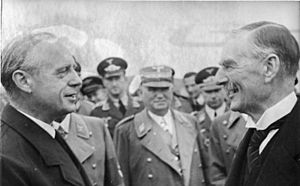
After Munich, Hitler was angry about not getting his war. He saw Britain as Germany's main enemy. Ribbentrop's influence grew because he also strongly disliked Britain.
In early 1939, Hitler decided to destroy the rest of Czechoslovakia. Ribbentrop played a key role. He pressured Slovak leaders to declare independence from Prague. He also told Hungary that Germany might support them taking parts of Slovakia. This forced Slovakia to declare independence, becoming a German puppet state.
On March 14–15, 1939, Ribbentrop pressured the Czech President, Emil Hácha, to turn his country into a German protectorate. German troops then occupied the Czech areas.
On March 20, 1939, Ribbentrop threatened Lithuania. He said if they didn't give the Memelland back to Germany, the German air force would bomb their city. Lithuania agreed.
Ribbentrop also allowed Hungary to take over Carpathian Ruthenia, a region in Czechoslovakia with many Ukrainian people. This showed that Germany was not interested in supporting Ukrainian independence at that time. This helped improve German-Soviet relations.
Pact with France, December 1938
In December 1938, Ribbentrop visited Paris to sign a French-German Non-Aggression pact. He later claimed that during this visit, the French Foreign Minister promised that France would recognize Eastern Europe as Germany's special area of influence.
Threats to Poland and British Promise
Germany first hoped Poland would become a satellite state and join the Anti-Comintern Pact. But by March 1939, Poland had refused Germany's demands three times. Hitler, with Ribbentrop's strong support, decided to destroy Poland.
On March 21, 1939, Hitler publicly demanded that Danzig return to Germany. Ribbentrop also made extreme demands to the Polish Ambassador, which made Poland fear an immediate German attack. Poland ordered a partial mobilization of its army. Ribbentrop told the German Ambassador in Warsaw that if Poland agreed, Germany would help them take parts of Slovakia and Ukraine. If not, Poland would be an enemy.
On March 26, Ribbentrop had a very angry meeting with the Polish Ambassador. He accused Poland of trying to bully Germany. He screamed that if Poland invaded Danzig, Germany would go to war. This behavior destroyed any chance of a peaceful solution.
The German occupation of Czechoslovakia in March 1939 angered Britain and France. Germany lost all sympathy because it had broken the Munich Agreement. The British government had believed Germany only wanted the Sudetenland, not to control all of Europe.
False reports in mid-March 1939 that Germany would attack Romania led Britain to change its policy. Ribbentrop denied these reports, but his denials sounded like his earlier denials about Czechoslovakia. This made the "Romanian war scare" worse. Britain wanted to keep Romania's oil out of German hands.
On March 31, 1939, British Prime Minister Chamberlain announced that Britain would go to war to defend Poland's independence. After this, Hitler often spoke of Britain trying to "surround" Germany. He used this as an excuse to cancel the Anglo-German Naval Agreement and the Non-Aggression Pact with Poland.
Turkey and the Balkans
In late March, Ribbentrop tried to pressure Turkey into an alliance with Germany. Turkey said they were fine with Germany having economic influence in the Balkans, but not political control.
In April 1939, Ribbentrop told his diplomats that Germany would attack Poland later that year. This news was welcomed by many German diplomats who disliked Poland.
Ribbentrop also learned that Britain and Turkey were planning an alliance. He sent Franz von Papen as Germany's ambassador to Turkey to try and win them over. But Ribbentrop and Papen argued a lot. Ribbentrop also shouted at the Turkish Ambassador in Berlin, believing it would make them understand. This heavy-handed approach led to Britain and Turkey signing an alliance on May 12, 1939.
From early 1939, Ribbentrop became the main supporter of an agreement with the Soviet Union. He saw this as the best way to attack Poland and then Britain. He was very happy when the Soviet leader, Joseph Stalin, gave a speech that seemed anti-Western.
Ribbentrop's efforts to turn the Anti-Comintern Pact into an anti-British alliance were not successful with Japan. So, he focused on a German-Italian treaty. This led to the signing of the Pact of Steel in May 1939. Ribbentrop falsely told Mussolini that there would be no war for the next three years to get him to sign.
Pact with Soviet Union and World War II
Ribbentrop was key in making the Molotov–Ribbentrop Pact with the Soviet Union in 1939. This was a non-aggression pact. Publicly, Ribbentrop was angry about Poland's refusal to give Danzig back to Germany. But privately, he made sure no real talks happened, so Germany would have an excuse for war. He feared Poland might give in, like Czechoslovakia did.
On May 25, 1939, Ribbentrop secretly told the Soviet Foreign Commissar, Vyacheslav Molotov, that if Germany attacked Poland, "Russia's special interests would be taken into consideration."
Ribbentrop told Hitler that any war with Poland would be very short. He believed Britain would be too shocked to react. He also told Italian Foreign Minister Ciano that neither Britain nor France would fight for Poland. Ribbentrop only showed Hitler reports that supported his view. He believed Britain was bluffing with its warnings.
The signing of the Molotov–Ribbentrop Pact on August 23, 1939, was Ribbentrop's biggest success. He flew to Moscow and signed the pact, which secretly divided parts of Eastern Europe between Germany and the Soviets. Ribbentrop was surprised to meet Stalin himself. They had friendly talks. Ribbentrop even gave a long speech against the British Empire, which Stalin approved of.
Ribbentrop convinced Hitler that this pact would make Britain give up on Poland. He argued that with Soviet support, Germany could not be stopped by a British naval blockade. On August 23, Hitler told his military leaders that neither Britain nor France would go to war without the Soviet Union. He set the invasion of Poland for August 26.
On August 25, 1939, Ribbentrop's influence weakened for a moment. News arrived that Britain and Poland had signed a military alliance. Also, Mussolini told Hitler that Italy would not join the war if Germany attacked Poland. This was a blow to Ribbentrop, who had always promised Hitler that Italy would support Germany. Hitler postponed the invasion of Poland until September 1.
On August 27, 1939, Chamberlain sent a letter to Hitler. It was meant to counter Ribbentrop's idea that the Soviet pact would make Britain abandon Poland. Ribbentrop told Hitler that Chamberlain's letter was just a bluff.
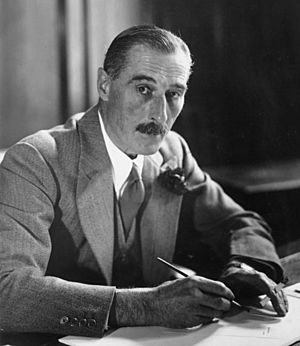
On the night of August 30–31, 1939, Ribbentrop had a very heated argument with British Ambassador Sir Nevile Henderson. Ribbentrop demanded that a Polish representative arrive that night to discuss Germany's "final offer." Henderson said the offer was reasonable but the time limit was not. He also asked why Ribbentrop couldn't give the offer to the Polish ambassador or provide a written copy. The meeting was so tense that they almost fought.
Ribbentrop's short time limit made it impossible for Britain to contact Poland. This allowed Ribbentrop to claim that Poland had rejected Germany's offer. This "rejection" was one of the excuses for Germany's attack on Poland on September 1, 1939.
On the morning of September 3, 1939, Britain declared war on Germany. A shocked Hitler asked Ribbentrop, "Now what?" Ribbentrop had no answer, except to say that France would also declare war soon. Historians believe Hitler thought he was starting only a local war with Poland. Ribbentrop's influence made Hitler go to war with Britain, the country he wanted as an ally, and have the Soviet Union, his enemy, as an ally.
After World War II began, Ribbentrop traveled with Hitler during the Invasion of Poland. On September 27, 1939, Ribbentrop went to Moscow again. He had to agree to give the Soviet Union more territory, including Lithuania. Germany now depended heavily on Soviet economic support because of the British blockade.
In March 1940, Ribbentrop met with Sumner Welles, an American diplomat on a peace mission. Ribbentrop told him that only a total German victory would bring peace. Welles reported that Ribbentrop had a "completely closed and very stupid mind."
In May 1940, Ribbentrop created a new department in the Foreign Office to handle anti-Jewish affairs. On May 10, 1940, he told the ambassadors of the Netherlands, Belgium, and Luxembourg that Germany had invaded their countries, hours after the invasions had already begun.
In June 1940, Mussolini finally decided to join the war. Ribbentrop welcomed this, as it made the Pact of Steel, which he had negotiated, seem more important. Ribbentrop also supported the idea of sending all of Europe's Jews to Madagascar after Britain was defeated.
Relations with Wartime Allies
Ribbentrop wanted Germany to allow Vichy France some independence within a partnership. He appointed Otto Abetz as Ambassador to France to promote politicians friendly to Germany.
From 1937, Ribbentrop pushed for an alliance between Germany, Italy, and Japan to divide the British Empire. After the Soviet-German pact, he wanted to include the Soviet Union in this alliance. This "Eurasian bloc" would destroy countries that relied on sea power, like Britain. Ribbentrop's ideas were different from Hitler's. Ribbentrop hated Britain and saw the Soviet Union as an important ally against it. Hitler saw the alliance with the Soviet Union as only temporary.
In August 1940, Ribbentrop oversaw the Second Vienna Award. This gave about 40% of Romania's Transylvania region to Hungary. Ribbentrop argued with the Hungarian delegation.
In late 1940, Ribbentrop tried to get Francoist Spain to join the war. He angered the Spanish foreign minister by suggesting Spain give the Canary Islands to Germany. The minister refused. However, Ribbentrop was more successful in September 1940. He helped negotiate the Tripartite Pact between Germany, Italy, and Japan.
In November 1940, Soviet Foreign Commissar Vyacheslav Molotov visited Berlin. Ribbentrop tried to get the Soviet Union to join the Tripartite Pact. He argued that they shared a common enemy in the British Empire. He suggested they could divide territories after Britain's defeat. Molotov was open to joining but demanded that Germany recognize several European countries as part of the Soviet sphere of influence. Ribbentrop could not convince Molotov to give up these demands. Hitler then decided he wanted to attack the Soviet Union instead.
As the war continued, Ribbentrop's relationship with the SS became difficult. In January 1941, the SS supported a coup attempt in Romania. Ribbentrop supported the Romanian government, while the SS supported the rebels. After the coup failed, Ribbentrop limited the power of SS police officers.
In March 1941, Japan's Foreign Minister visited Berlin. Ribbentrop, following Hitler's orders, did not tell the Japanese about the upcoming invasion of the Soviet Union. Hitler wanted Japan to attack Britain instead. Ribbentrop tried to convince Japan to attack the British naval base at Singapore.
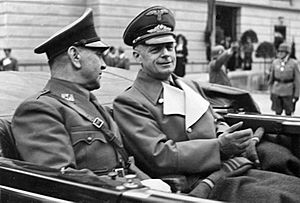
In late 1940 and early 1941, Ribbentrop pressured Yugoslavia to sign the Tripartite Pact. He was warned this might lead to the overthrow of the Yugoslav leader. Yugoslavia signed the pact on March 25, 1941, but the next day, the military overthrew the government. Hitler ordered the invasion of Yugoslavia. Ribbentrop was against this because he thought his office would lose power in occupied Yugoslavia.
Ribbentrop liked Joseph Stalin and did not want to attack the Soviet Union in 1941. He secretly told a Soviet diplomat, "Please tell Stalin I was against this war, and that I know it will bring great misfortune to Germany."
Despite his opposition to the invasion, Ribbentrop tried to get Japan to attack the Soviet Union. He also had Germany break off relations with China and recognized the Japanese puppet government there.
After the war, Ribbentrop was found responsible for his part in the the Holocaust. He worked to convince leaders of Nazi-controlled states to send Jewish people to the Nazi death camps. In August 1941, he helped arrange agreements to deport foreign Jews living in Germany. In September 1941, he ordered a German official to fully cooperate in the massacre of 8,000 Serbian Jews.
In late 1941, Ribbentrop worked to make Japanese-American talks fail. He wanted Japan to attack the United States. He told Hitler that a war between the US and Germany was unavoidable. He believed the US was not a serious military power. On December 4, 1941, the Japanese ambassador told Ribbentrop that Japan was about to go to war with the US. Ribbentrop promised Germany would join. On December 7, 1941, Ribbentrop was very happy about the Japanese attack on Pearl Harbor. He strongly supported a declaration of war on the United States. He delivered the official declaration on December 11, 1941.
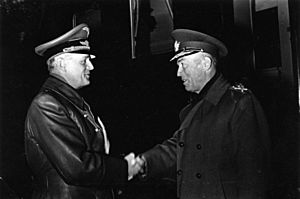
The Foreign Office, led by Ribbentrop, played a key role in arranging the deportations of Jewish people to death camps from France, Hungary, Slovakia, Italy, and the Balkans. Ribbentrop assigned this work to Martin Luther, who represented the Foreign Ministry at the Wannsee Conference.
In November 1942, Ribbentrop met with French leader Pierre Laval. He gave Laval an ultimatum for Germany to occupy the French unoccupied zone. In December 1942, he met with Italian Foreign Minister Ciano. Ribbentrop joined Hitler in criticizing Italy's war effort.
In April 1943, Ribbentrop strongly pressured Hungary's leader, Miklós Horthy, to deport their Jewish population to the death camps. He said, "the Jews must either be exterminated or taken to the concentration camps. There is no other possibility."
Declining Influence
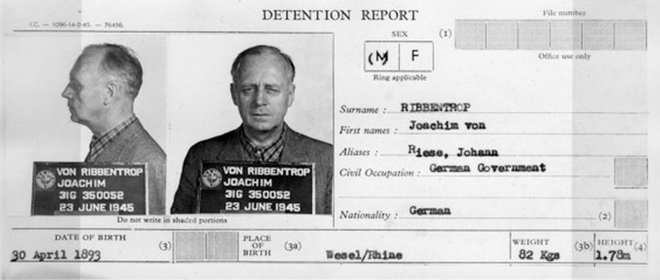
As the war continued, Ribbentrop's power decreased. Most of the world was at war with Germany, so diplomacy became less important. By January 1944, Germany had few diplomatic relations left.
Hitler found Ribbentrop annoying and started to avoid him. Ribbentrop's requests to seek peace with some of Germany's enemies, especially the Soviet Union, made their relationship worse. As his influence faded, Ribbentrop argued with other Nazi leaders over who controlled anti-Jewish policies, trying to please Hitler.
Ribbentrop faced a big problem when many old Foreign Office diplomats were involved in the July 20, 1944 attempt to kill Hitler. Ribbentrop didn't know about the plot, but it made him look bad. Hitler felt Ribbentrop's office was too big for him to control his diplomats. Ribbentrop then worked with the SS to remove those involved in the plot.
On April 20, 1945, Ribbentrop attended Hitler's 56th birthday party in Berlin. Three days later, Ribbentrop tried to meet Hitler, but Hitler refused.
Arrest and Trial
After Hitler died, Ribbentrop tried to find a role with the new president, Karl Dönitz, but was rejected. He went into hiding in Hamburg under a false name. On June 14, after Germany surrendered, Ribbentrop was arrested. He had a letter to British Prime Minister Winston Churchill blaming Britain for not allying with Germany before the war. He said this led to the Soviet occupation of eastern Germany.
Ribbentrop was a defendant at the Nuremberg trials. The court found him responsible for planning aggressive war, war crimes, and crimes against humanity. The court said Ribbentrop was actively involved in planning the takeover of Austria, Czechoslovakia, and Poland. He was also deeply involved in the "final solution," ordering German diplomats to speed up the process of sending Jewish people to death camps. He supported the killing of Allied airmen and helped cover up the murder of a French officer. He was directly responsible for terrible actions in Denmark and Vichy France.
Ribbentrop claimed that Hitler made all the important decisions and that he was tricked by Hitler's promises of peace. But the court rejected this. They said that because Ribbentrop was so involved in the war, he must have known about Hitler's aggressive plans. Even in prison, Ribbentrop remained loyal to Hitler.
An American psychologist tested the Nazi leaders. Ribbentrop scored 129 on an IQ test, which was one of the highest scores. A US Army interpreter once asked a German diplomat how Hitler could have promoted Ribbentrop. The diplomat replied, "Hitler never noticed Ribbentrop's babbling because Hitler always did all the talking."
On October 16, 1946, Ribbentrop was the first person sentenced to death at Nuremberg to be hanged. Before his execution, he said: "God protect Germany. God have mercy on my soul. My final wish is that Germany should recover her unity and that, for the sake of peace, there should be understanding between East and West. I wish peace to the world." His body was cremated, and his ashes were scattered in a river.
Film Portrayals
Joachim von Ribbentrop has been played by these actors in movies and TV shows:
- Henry Daniell in Mission to Moscow (1943)
- Graham Chapman in Monty Python's Flying Circus (1970)
- Henryk Borowski in Epilogue at Nürnberg (1971)
- Geoffrey Toone in The Death of Adolf Hitler (1973)
- Robert Hardy in The Gathering Storm (1974)
- Kosti Klemelä in Sodan ja rauhan miehet (1978)
- Demeter Bitenc in Slom (1979)
- Frederick Jaeger in Winston Churchill: The Wilderness Years (1981)
- Anton Diffring in The Winds of War (1983)
- Hans-Dieter Asner in Mussolini and I (1985)
- Richard Kane in Mussolini: The Untold Story (1985)
- John Woodvine in Countdown to War (1989)
- Wolf Kahler in The Remains of the Day (1993)
- Benoît Girard in Nuremberg (2000)
- Bernd-Uwe Reppenhagen in Netaji Subhas Chandra Bose: The Forgotten Hero (2004)
- Ivaylo Geraskov in Nuremberg: Nazis on Trial (2006)
- Edward Baker-Duly in Upstairs, Downstairs (2010)
- Holger Handtke in Hotel Lux (2011)
- Orest Ludwig in The Plot Against America (2020)
See also
 In Spanish: Joachim von Ribbentrop para niños
In Spanish: Joachim von Ribbentrop para niños
- Otto Abetz: German Ambassador to Vichy France (1940–1944)
- Rudolf Buttmann: German Ambassador to the Vatican (1920–1943)
- Hans-Heinrich Dieckhoff: German Ambassador to the United States of America (1937–1938) and Spain (1943–1945)
- Herbert von Dirksen: German Ambassador to the Soviet Union (1928–1933), Japan (1933–1938), and the United Kingdom (1938–1939)
- Glossary of Nazi Germany
- Fritz Grobba: German Ambassador to Iraq (1932–1939, 1941) and Saudi Arabia (1938–1939)
- Ulrich von Hassell: German Ambassador to Italy (1932–1938)
- Eduard Hempel: German Ambassador to Ireland (1937–1945)
- Walther Hewel: German diplomat
- Leopold von Hoesch: German Ambassador to France (1923–1932) and the United Kingdom (1932–1936)
- Manfred Freiherr von Killinger: German Ambassador to the Slovak Republic (1940) and Romania (1940–1944)
- List of Nazi Party leaders and officials
- Hans Luther: German Ambassador to the United States of America (1933–1937)
- Eugen Ott: German Ambassador to Japan (1938–1942)
- List SS-Obergruppenführer
- Heinrich Georg Stahmer: German Ambassador to Japan (1942–1945)
- Hans Thomsen: German diplomat
- Diego von Bergen: German Ambassador to the Vatican (1915–1918, 1920–1943)
- Franz von Papen: German Ambassador to Austria (1934–1938) and Turkey (1939–1944)
- Cecil von Renthe-Fink: German Ambassador to Denmark (1940–1942)
- Friedrich Werner von der Schulenburg: German Ambassador to the Soviet Union (1934–1941)
- Ernst von Weizsäcker: German Ambassador to the Vatican (1943–1945)
 | Lonnie Johnson |
 | Granville Woods |
 | Lewis Howard Latimer |
 | James West |


